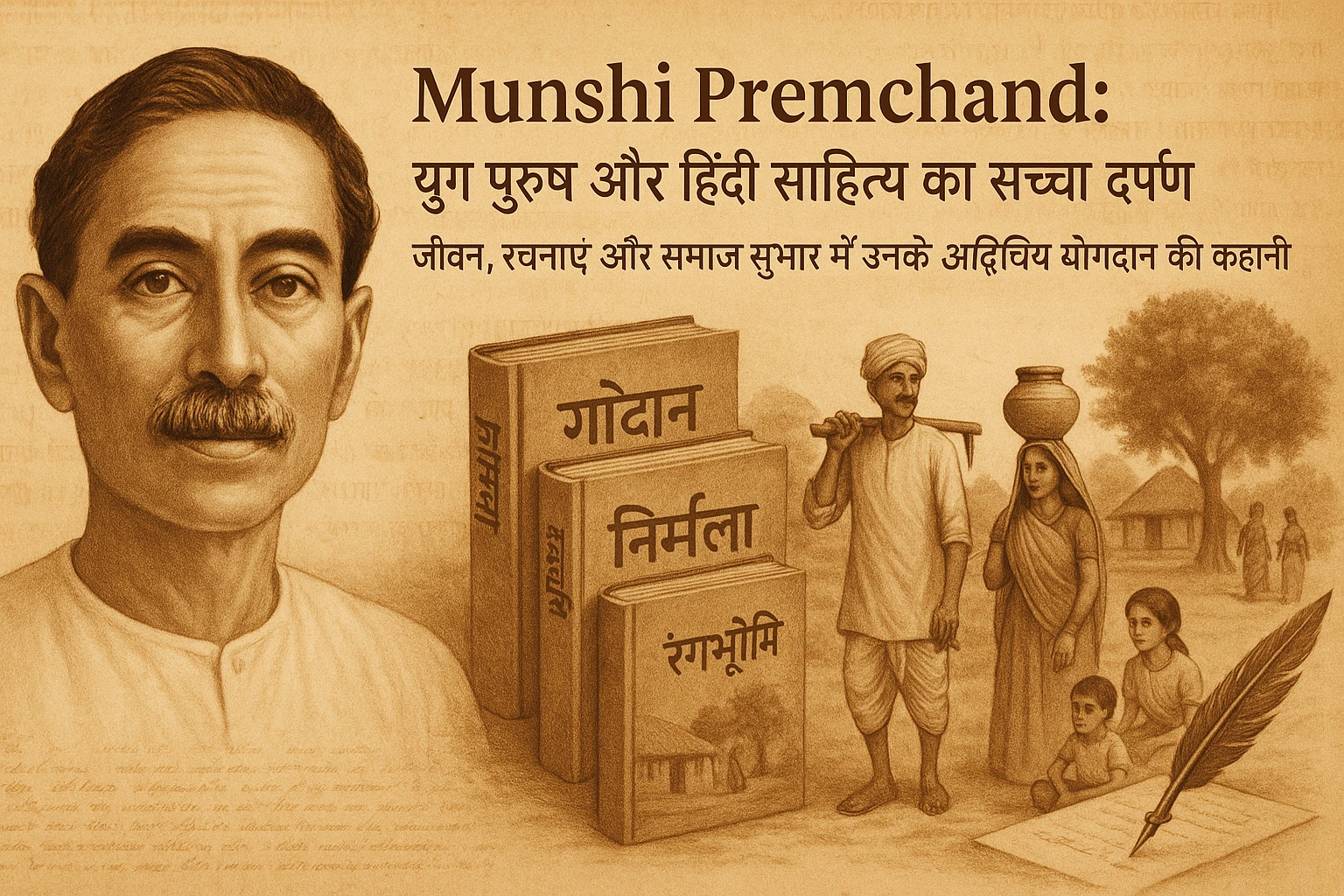Preface:
Munshi Premchand’s name is inscribed in golden letters in Hindi literature. He was a writer whose compositions highlight the reality of society. Premchand’s stories, novels and essays are as relevant today as they were in their time. He used to present the suffering of farmers, labourers, women, and the lower class with great sensitivity.
In this article, we will discuss in detail the topics like Premchand Ka Jivan Parichay, his literary contribution, Munshi Premchand Ki Kahani, Munshi Premchand Books, and Premchand Bairwa.
Premchand ka jivan parichay:
- Full Name: Dhanpat Rai Srivastava
- Nickname: Munshi Premchand
- Birth: 31 July 1880, Lamhi Village, Varanasi, Uttar Pradesh
- Father: Ajayab Lal (Post Office Employee)
- Mother: Anandi Devi
- Death: 8 October 1936, Banaras
Premchand’s life was very difficult. His mother died at a very young age, and his father also passed away early. He completed his education in poverty and later became a school teacher. Along with this, he started taking an interest in writing.
Premchand’s literary journey:
Munshi Premchand started his writing in Urdu as “Nawab Rai”. Later, he made Hindi his literary medium. His first story collection, “Soz Watan”, was banned by the British government, as it had a sense of patriotism. He then started writing under the name Munshi Premchand.
Premchand’s writing style:
The writing style of Prem Chand was spontaneous, simple, and realistic. He used to stay away from heavy words and give esoteric messages in the language of the general public. He placed social evils, casteism, poverty, female atrocities and the feudal system in his literature.
Munshi Premchand Books (Famous compositions):
Major novels:
Novel name | Subject matter |
Godan | Farmers’ tragedy and the inequality of society |
Embezzlement | Corruption and social fraud |
Nirmala | Based on child marriage and the dowry system |
Rangbhoomi | Social reform through the blind character Surdas |
Sevasadan | Female liberation and society’s morality |
Karmabhoomi | Freedom struggle and the role of youth |
Famous stories (Munshi Premchand ki kahani):
- Pus Ki Night – Poor farmer’s cold night agony
- Idgah – Hamid and his emotional understanding
- Shroud – Poverty and insensitivity
- Salt’s intention – Honesty versus corruption
- Thakur’s well – Surprise on casteism
- Daughter of a big house – duality of ego and rituals
Premchand’s journalism and social contribution:
Munshi Premchand was not only a writer but also a sensitive journalist. He edited magazines like Hans, Jamana, Madhuri and gave prominence to social reform. He believed that the work of literature is not only entertainment, but also to guide society.
Premchand Bairwa and Premchand’s effects:
Even today, the name Premchand is a source of inspiration for many literature lovers. Many writers, such as Premchand Bairwa, are engaged in the creation of literature by taking inspiration from Premchand’s realistic perspective. Premchand’s name has now become an ideology that arouses condolences and social consciousness among new writers and readers.
Education and Job:
Munshi Premchand received an English, Persian and Urdu education. He completed his education up to intermediate and then became a teacher. He later served as Deputy Inspector. He was active in writing even during his job.
Premchand’s place in literature:
Munshi Premchand is called the “novel emperor” of Hindi literature. He was the father of Indian realism. In his literature, the hero is not a king-emperor but a common farmer, labourers, women, and Dalits. This makes them different from the rest of the authors.
International Premchand:
Premchand’s works have been translated into many languages. Munshi Premchand’s Books are still read in Japanese, Russian, English and other languages. His novels and stories have also been produced dramatized and films have also been produced.
Films made on Premchand’s works:
- Sadgati (1981) – Directed by Satyajit Ray
- Godan – Famous as both a TV serial and a film
- Idgah – Special Film Production for Children
Munshi Premchand’s ideology:
Premchand believed that –
Literature should be a mirror of society.
He was influenced by Gandhian ideas, and this glimpse can be seen in his literature. He made writing a tool of social reform.
Awards and Honours:
Although he did not get any special government award during his lifetime, today:
- The highest award in Hindi literature, the “Munshi Premchand Award“, is given after him.
- Roads, libraries, schools and cultural centres are established across the country.
Death of Munshi Premchand:
Munshi Premchand died on 8 October 1936 in Banaras. He was editing Hans magazine at that time. His last work, Mangalsutra, remained incomplete, which was later completed by his son Amrit Rai.
What can we learn from Premchand?
- Courage to tell the truth
- Condolences to the poor
- The purpose of literature is – improvement of society
- Esotomize
- Struggle for patriotism and social justice
Conclusion:
Munshi Premchand is the star of Hindi literature whose brightness still fills light in the minds of countless readers. He made literature a mirror of society and started a new tradition. Whether it is Munshi Premchand Ki Kahani or Munshi Premchand Books, we get to see the reality of Indian society in every composition.
Today, when we read any literary work, we get the shadow of Premchand in it. This is his biggest success.

